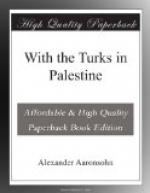In spite of these drawbacks, however, he attempted to work up a scientific campaign. Djemal Pasha put some thousands of Arab soldiers at his disposition, and these were set to work digging trenches into which the hatching locusts were driven and destroyed. This is the only means of coping with the situation: once the locusts get their wings, nothing can be done with them. It was a hopeless fight. Nothing short of the cooeperation of every farmer in the country could have won the day; and while the people of the progressive Jewish villages struggled on to the end,—men, women, and children working in the fields until they were exhausted,—the Arab farmers sat by with folded hands. The threats of the military authorities only stirred them to half-hearted efforts. Finally, after two months of toil, the campaign was given up and the locusts broke in waves over the countryside, destroying everything. As the prophet Joel said, “The field is wasted, the land mourneth; for the corn is wasted: the new wine is dried up, the oil languisheth.... The land is as the garden of Eden before them, and behind them a desolate wilderness.”
Not only was every green leaf devoured, but the very bark was peeled from the trees, which stood out white and lifeless, like skeletons. The fields were stripped to the ground, and the old men of our villages, who had given their lives to cultivating these gardens and vineyards, came out of the synagogues where they had been praying and wailing, and looked on the ruin with dimmed eyes. Nothing was spared. The insects, in their fierce hunger, tried to engulf everything in their way. I have seen Arab babies, left by their mothers in the shade of some tree, whose faces had been devoured by the oncoming swarms of locusts before their screams had been heard. I have seen the carcasses of animals hidden from sight by the undulating, rustling blanket of insects. And in the face of such a menace the Arabs remained inert. With their customary fatalism they accepted the locust plague as a necessary evil. They could not understand why we were so frantic to fight it. And as a matter of fact, they really got a good deal out of the locusts, for they loved to feast upon the female insects. They gathered piles of them and threw them upon burning charcoal, then, squatting around the fire, devoured the roasted insects with great gusto. I saw a fourteen-year-old boy eat as many as a hundred at a sitting.
CHAPTER VIII
THE LEBANON
During the locust invasion my brother sent me on an inspection tour to investigate the ravages of the insect in Syria. With an official boyouroulton (passport) in my pocket, I was able to travel all over the country without being interfered with by the military authorities. I had an excellent opportunity to see what was going on everywhere. The locusts had destroyed everything from as far south as the Egyptian desert to the Lebanon Mountains on the north; but the locust was not the only, nor the worst, plague that the people had to complain of. The plundering under the name of “military requisitions,” the despotic rule of the army officers, and the general insecurity were even more desolating.




